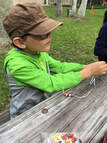|
Talking About
Florida Homeschooling... Evaluations and More |
A good evaluator works for the parents, assisting them in meeting legal requirements and in supporting them when districts overstep their bounds." |
Tips for Homeschooling Teens
intent on fighting their parents at every turn. Even teens who were previously wonderful darlings who readily went along with all the educational plans put in front of them, may now balk at their parents' plans. That's normal. It's part of how teens push to develop their own identity and get mentally and emotionally ready for a life on their own. But at the same time, parents want their teens to be on track to do well as adults, to be prepared for college or careers or trade school or whatever life holds for them. Here are some ways to move past these attitudes and successfully homeschool a teen. 1. Consider Beginning with Deschooling. Deschooling is a transition process in which the homeschooling doesn't start off with textbooks/workbooks and doesn't try to look like school. This can help students move past any previous trauma experienced through schools, and also help teens understand that parents can direct an education without faking a school. Read here for more information on deschooling. 2. Help Your Teen Figure out Life Goals If your teen hasn't yet figured out what he or she wants to do after high school, take time out to work on figuring that out. This can be a big part of deschooling. Find books or websites with information about various career options. Discuss aspects of jobs that your teen may not have considered such as whether the job includes paid sick days, sitting at a desk inside, being outside in all kinds of weather, the comforts of air conditioning and heat, predictable pay checks, predictable work schedules, required overtime, the excitement of bonus checks, etc. or not. Talk about how these will affect their life style as adults and get them to start thinking about the kind of life style they want. Get the teen to think about his or her interests and skills, too, while considering job possibilities. If your teen figures out a path for life, this information can then be used to guide the learning. For example, an internship or volunteer position that your child could work at in the career field of his or her choice could be part of the learning and help your teen figure out if that career choice is really a good fit and if so, to prepare for it and network within it. Talking with professionals in the field can also help. Also, when it is time to study English or history or other fields, reading and writing about topics relevant to the chosen career field can help your teen be better prepared for adult life while also seeming more relevant to his or her life (and thus something that the teen won't fight as much). What if the teen changes his or her mind later about career goals? The reading, writing, etc. skills learned can transfer to other fields if the teen was willing to work on those skills. If your teen doesn't figure out a path for life, the time spent learning about the options can still be important in helping the teen continue to think about the options and eventually figure it out. Likely, he or she will at least begin to eliminate some choices and begin to narrow down the options. 3. Have Your Teen Plan Some Projects Challenge your teen to choose a topic to learn more about and put together a project of their choosing on it. The topic doesn't have to be academic. Let the teen choose the methods and materials to use to learn more about it. These sorts of studies will help parents figure out how the teen prefers to learn so any future planning can work with the teen's learning style instead of against it. Such projects can help the teen realize how much learning can be done outside of the structure of school. Perhaps even more important are the roles such studies can potentially make in a teen's future. Oftentimes, topics that the teen is interested in will be a step towards a career choice or a lifelong hobby. In my experience as a college interviewer, if the topic is academic, a teen-generated study can play a big role in helping the teen be accepted at colleges which want to see intellectual curiosity in their students. 4. Involve Your Teen in Planning. Teens want independence. They want to be treated as adults. One way to work with that (instead of against it) is to invite the teen to help plan his or her own education. This could mean, as the deschooling process is winding down, asking the teen's input on curriculum or other materials to use, or showing the teen a few options and letting the teen pick. It could even mean giving the teen a few guidelines but then asking the teen to plot out the courses. For example, with my teens, I laid out the course types I wanted them to complete to finish their high school program. (I based those choices on the public school general courses as I chose to follow their basic plan, but those are not the only graduation requirements parents may choose to use.) One wanted to join a gym and a martial arts class for an elective PE course. He wanted to use videos to study American history and so together we found a website that gave a list of videos to use for high school American history. We decided that he'd watch 120 hours of videos from the list and would write a paper for each video describing what he learned from it to earn a credit. For another course, he put together a book list that he read to learn more about military history and strategy for an elective history class we called Introduction to Military History since he wanted to enlist in the military. For another elective, he got some homeschool friends together and they learned how to use editing software to make videos and then each wrote a script and then worked together to direct and act in videos that they edited. Eventually they put together a film premiere to show off their creations. Another of my teens wanted to use Youtube videos on drawing to improve her sketching and filled a sketchbook but also put together an art club that she ran for some other homeschooled children and taught them some of the art techniques that she's learned. Other classes we designed used graphic novels we found at the library to study topics from Shakespeare to physics to history. I've known other families who designed a variety of courses including making lots of soaps to eventually study chemistry and business or teens who found classes at a local community college to study and earn a cosmetology license or found online classes to earn certificates to become a home inspector. The options are endless. 5. Dual Enrollment Classes. As the homeschooling proceeds, dual enrollment college classes may be an option for teens who want to earn a college degree or even to finish a trade school training program. Many homeschooled teens will earn free college credits before graduating high school; some even earn a two-year AA degree before getting a high school diploma from their parents. Homeschooling teens doesn't have to follow the typical path public schools follow. The methods, materials used, etc. can be very different. Homeschooled teens might start off with an informal education that doesn't resemble school, but this can be helpful in making the education work better long-term. Figuring out courses unique to your child may actually improve the child's learning and the potential for college or career success. Mostly, involving the teens a lot in decision-making can help them be much more successful. Cheryl--homeschool mom and evaluator since 2003
0 Comments
Your comment will be posted after it is approved.
Leave a Reply. |
Archives
April 2024
Categories
All
|

 RSS Feed
RSS Feed







